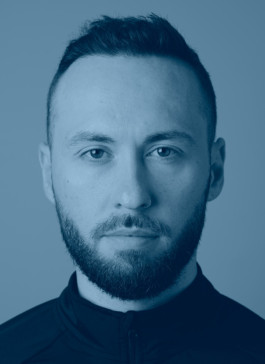Dean: “We do seem to be seeing an increase in people who have serious psychotic symptoms which was quite uncommon before Covid”


listen:
Content warning; contains references to mental illness and suicide
Photography: Lottie Davies
Audio Producer: Dave Dodd
read:
Isolation is a huge thing.
Because we rely on people to raise the alarm really, if people aren’t able to seek help themselves. But if they’re isolated, they’re not able to see loved ones. They’re not going to work. They’re not going to college. They’re not going to their usual places. Who is going to raise the alarm?
I’m Dean Williams. I’m a mental health nurse that works in liaison psychiatry, in Acute General Hospital in Portsmouth.
I think when we initially started hearing what was happening in China and the pandemic it was almost disbelief, because I’ve, you know, I’ve never experienced anything like that before. When it first felt real is when our team where moved out of the hospital. I didn’t know what was gonna happen.
There were talks that in, kind of the worst case scenario, that mental health teams would cease to function, and we’d be called into other areas to support people who were presenting with Covid. You know, we heard and read the stories about what had happened in Italy. There was real fear that that’s what was going to happen here. Yeah, and along with that fear, that there would be a huge number of people who might take their life. That was kind of the biggest fear for us as well. People not being able to get mental health support and having no other option.
There was an initial delay. So when we first went into lockdown, we as a mental health service in the hospital become very, very quiet. I’ve never known referrals to be that low. And people were really staying away from the hospital. And that was the message that was sent out, you know: support the NHS, and not overwhelm the NHS. So people stayed at home. And then, once things began to ease, people did begin to present.
At the moment, we’re seeing what feels like more professionals – so perhaps people who wouldn’t necessarily walk into the emergency department prior to Covid. One example is a lady who was in her 30s, a professional – she was a solicitor – and with no previous mental health history known. Her family brought her in. She believed that her family had been killed, and the people that were around her were imposters. And that was really distressing for her and really distressing for the family. And she was being quite aggressive because of those delusions. She spoke in her mother tongue, which was a foreign language – although she could speak English – but the family were able to interpret on our behalf.
So psychosis, in a nutshell, is a kind of break from reality really. Hallucinations, auditory, visual… essentially, experiences that feel very real but, ultimately, aren’t real. Paranoid thoughts, people feeling that they’re being watched or that there’s conspiracies against them. And some people have insight into those, and some people are too unwell to realise that what they’re experiencing isn’t real. It can be very scary.
So we don’t know for certain – there’s no sure way of knowing that the lockdown caused her illness. She wasn’t isolated at home. She lived with family. So family observed this kind of build up over a matter of days. Certainly what the theme appeared to be was that she hadn’t slept for a number of days; that she was very stressed; that she was struggling with not being able to see her boyfriend who lived in London; not being able to work, that change in routine. I think those are all things that have hugely impacted her mental health.
We do seem to be seeing an increase in people who have very severe serious psychotic symptoms, which was quite uncommon before Covid I would say. I mean, we would see those people. But it was relatively rare.
It can be very distressing, especially when there’s family members involved who don’t know what to do and are alarmed. We’ve seen a number of people present to the hospital who also work in health and social care – kind of similar professions to mine.
And that’s been quite grounding, really. That, you know, mental illness doesn’t discriminate: it can impact and affect anyone, from any walk of life. I know of colleagues that have had to have made huge changes and adaptions because of Covid. You know, having to change out of their work clothes before leaving work, which we all do, and then returning home, changing once again at their front door before they can even hug their child. Ultimately, we want to be able to do our job and we want to help people, but also they want to keep themselves and their family safe.
So it’s been a really difficult time.
But yeah, I don’t… you know, I’m going to work and I feel supported. And I know it’s gonna be okay, because I’ve got people around me who are able to support me. Some days are a real challenge. But I feel ultimately I’m really lucky in the job that I do. I get to help people when they’re at their most vulnerable and I’m able to kind of give them some hope.
I’m quite an inquisitive person. So I will, like, walk down streets that I don’t know. To see what’s down there, you know, to see what the houses look like and things like that. So that’s been something that I’ve kind of been doing for my own wellbeing. It was really important for me just to get out, even if I didn’t have anywhere particularly where I was going to. Just getting out and walking.
An Empathy Museum project made with the support of NHS England and NHS Improvement, The Health Foundation, and Arts Council England